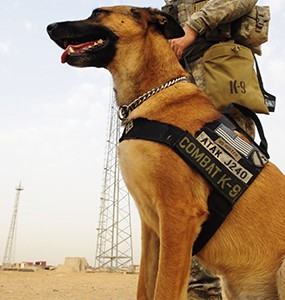
Dr. Ernie Ward discusses a revolutionary new way to understand how dogs think and how it can affect the future of service dogs.
Are good dogs born or raised? Can the best service dogs be reliably selected when only a few weeks old? These are questions the US military wants to answer.
DARPA, the military’s Defense Advanced Research Projects Agency, is using the latest in medical technology to determine if young pups can be scientifically tested to determine the best candidates for service. The project code-named FIDOS – ““Functional Imaging to Develop Outstanding Service-Dogs” – is designed to “optimize the selection of ideal service dogs.” Sounds like science fiction, right? Wrong. This research is currently being conducted and the preliminary results are encouraging. But before we look to the future, let’s take a look at why DARPA would be interested in this issue at all.
It’s no secret that military dogs are in demand. Whether on the battlefield, patrolling borders or bases, or increasingly in the treatment of post-traumatic stress disorder (PTSD) and traumatic brain injury (TBI), service dogs are being used in record numbers for more jobs than ever before. Traditional methods for finding and developing the best service dogs were based primarily on the personal experience of handlers and breeders. Call it intuition, gut instinct, or educated guesses, that was as it good as it got for the past 100 years. Unfortunately, tens of thousands of dollars and years could be wasted on a dog before discovering that military or medical service just wasn’t the canine’s passion. Ultimately, that meant the supply of assistance dogs would fall short of demand. There had to be a better way.
Enter the high-tech world of functional magnetic resonance imaging (fMRI). This is similar to a regular MRI except it’s specifically designed to monitor real-time brain activity. These machines are used to figure out what parts of the human brain are most active when you watch a movie, listen to music, or imagine lying on a tropical beach. fMRI has been instrumental in understanding many diseases such as Alzheimer’s and Parkinson’s. These tests haven’t been used as widely on animals because it’s hard to train a dog to lie still enough in the circular device. More often than not, the animal must be sedated, making brain scans of real-time events nearly impossible. Nearly.
Some very bright minds at Emory University in Georgia decided to find out last year if they could train dogs to sit still enough to undergo fMRI. Turns out they could. The insights they gained into how dogs think led to the recent DARPA initiative. The new study is researching how young pups respond to rewards such as treats and praise. Those that demonstrate enhanced brain activity in a region associated with rewards and attention to human movement and commands are chosen for training.
This is sure to cause considerable controversy and reignite “nature versus nurture” debate. The theory is that pups hardwired to respond to positive rewards will be easier and faster to train, recognize stress better in PTSD patients, and save taxpayers millions of dollars. Breeding practices could be refined, creating potentially larger litters of ideal working dogs. Even better, by selecting these “super-service dogs,” DARPA hopes to develop entirely new ways to utilize man’s best friend. Perhaps by selecting the best-of-the-best dogs, we’ll discover they’re capable of much more than sniffing for bombs and barking at bad guys. I’m personally excited to see where this research leads. My guess is we’ll learn much more about what makes dogs the incredible creatures we’re privileged to love.
If you have any questions or concerns, you should always visit or call your veterinarian – they are your best resource to ensure the health and well-being of your pets.
The opinions and views expressed in this post are those of the author's and do not necessarily represent the beliefs, policies or positions of PetHealthNetwork.com, IDEXX Laboratories, Inc. or its affiliates and partner companies.




